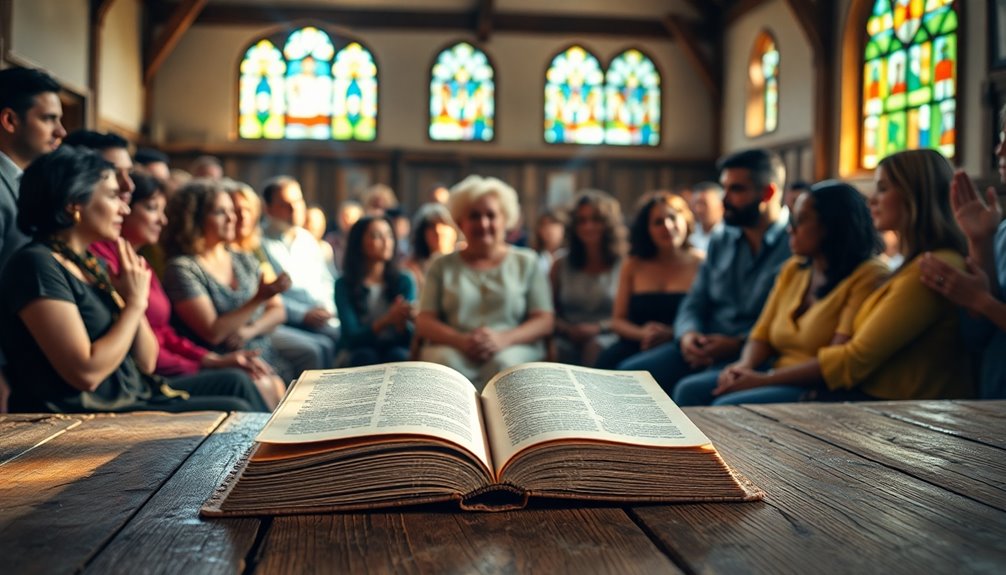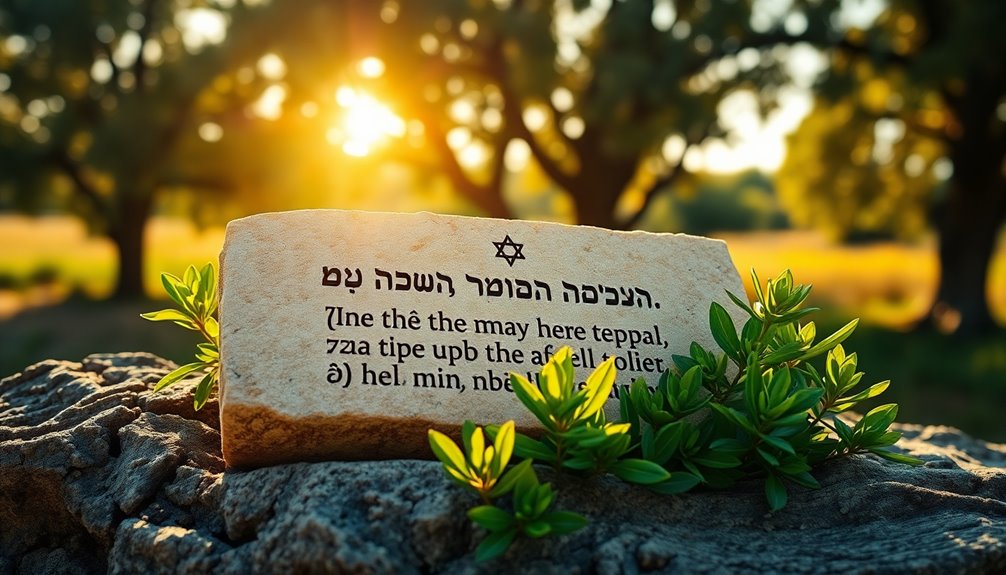The Book of Enoch is a fascinating non-canonical text attributed to Enoch, the great-grandfather of Noah. It's made up of five sections that discuss topics like angelology, the judgment of fallen angels, and the mysterious Nephilim. While it contains rich insights about divine justice and morality, it wasn't included in the Bible. Various Jewish sects valued it during the Second Temple period, and early Christians found it influential for understanding themes like the Messiah and resurrection. There's so much more to uncover about its impact and themes, which you'll find intriguing as you explore further.
Key Takeaways
- The Book of Enoch is a non-canonical text attributed to Enoch, great-grandfather of Noah, composed between 300 and 100 BCE.
- It consists of five sections focusing on angelology, the judgment of fallen angels, and the Nephilim.
- The text is significant in Second Temple Judaism, influencing early Christian thought, particularly on themes of judgment and divine intervention.
- Although excluded from the canonical Bible, Enoch's themes resonate with moral integrity and the consequences of rebellion against God.
- Preservation among the Dead Sea Scrolls highlights its importance to specific Jewish audiences dealing with issues of purity and justice.
Introduction

The Book of Enoch, often overshadowed by canonical scriptures, offers a fascinating glimpse into ancient Jewish thought and apocalyptic literature. Attributed to Enoch, the great-grandfather of Noah, this non-canonical text, primarily known as 1 Enoch, comprises five sections that delve into themes like angelology, the judgment of fallen angels, and the Nephilim.
While it was widely read during the Second Temple period, its exclusion from the biblical canon stemmed from concerns over heretical content and the absence of apostolic authorship.
Most notably, the Book of Enoch is preserved mainly in a Geez (Ethiopic) translation, with no known Hebrew version, though fragments were found among the Dead Sea Scrolls.
Its influence on early Christian thought is significant, as evidenced by its reference in Jude 1:14-15. The early Church Fathers recognized its theological implications, even as they debated its place in the broader scriptural narrative.
Biblical References to Enoch

When you look at the Bible, you'll find several key references to Enoch that highlight his significance.
In Genesis, his close relationship with God is noted, while Jude brings in a prophecy that speaks to the judgment of the ungodly.
These passages, along with others, form a foundation for understanding Enoch's role in biblical texts.
Primary Bible References
Throughout biblical texts, Enoch stands out as a notable figure whose references highlight his unique relationship with God. In Genesis 5:24, you'll find the poignant statement, "Enoch walked with God; then he was no more, because God took him away." This illustrates his extraordinary connection with the divine.
Enoch in Jude also captures attention, as Jude 1:14-15 cites him as a prophet who spoke about God's judgment against the ungodly. This reference suggests that early Christians were familiar with the Book of Enoch, though it doesn't mean the entire work is regarded as divinely inspired scripture.
Additionally, Hebrews 11:5 emphasizes Enoch's faith, stating that he was taken up so he wouldn't experience death. This further solidifies his importance in the Bible's narrative around faith and divine favor.
The Book of Enoch delves into themes like the Nephilim and fallen angels, which resonate with Genesis 6:1-4, where the "sons of God" interacted with the "daughters of men." These primary references collectively highlight Enoch's significance in discussions about faith, judgment, and divine insight throughout biblical literature.
Secondary Bible References
References to Enoch aren't limited to the primary biblical texts; they also appear in various secondary sources that enrich our understanding of his role. In the New Testament, Jude 1:14-15 quotes Enoch, prophesying about the impending judgment on ungodly sinners. This citation shows Jude's familiarity with Jewish oral traditions and aligns with themes in the Book of Enoch that discuss divine judgment.
Furthermore, Hebrews 11:5 highlights Enoch's profound faith and unique relationship with God, echoing his portrayal in the Book of Enoch. Additionally, the Book of Enoch offers insight into the "sons of God" mentioned in Genesis 6:2, interpreted as fallen angels, a concept that Jude also addresses.
The influence of the Book of Enoch extended into the first century, where early Church Fathers like Justin Martyr and Irenaeus recognized its teachings.
Despite its eventual exclusion from the biblical canon, their acknowledgment indicates the Book's significant impact on early Christian thought. These secondary references to Enoch not only affirm his importance but also illustrate the broader theological discussions happening within the early Church.
Second Temple Judaism Influences

Although the Book of Enoch is often overlooked, it plays a crucial role in understanding the influences of Second Temple Judaism. Composed during the Second Temple period, this text reflects the apocalyptic themes and eschatological expectations that were significant in Jewish thought at that time.
You'll notice its distinctive divergence from mainstream Pharisaic Judaism, particularly through its association with various Jewish sects, including the Qumran community.
The Book of Enoch delves into angelology and cosmology, providing a complex view of heavenly beings and their roles in human affairs. This exploration was vital to Second Temple literature, as it shaped how communities interpreted divine intervention and judgment.
Enoch's teachings on divine judgment and the fate of the wicked resonate with the messianic expectations emerging in this period, paralleling other contemporary writings.
Moreover, the preservation of Enochic texts among the Dead Sea Scrolls underscores their importance to a specific Jewish audience. This audience grappled with issues of purity, divine justice, and the hope for a messiah, making the Book of Enoch a critical piece in understanding Second Temple Judaism's rich tapestry.
Cultural Impact on Early Christianity

Many early Christians found the Book of Enoch to be a significant source of inspiration, shaping their understanding of key theological concepts such as the Messiah, resurrection, and divine judgment. This apocryphal book resonated powerfully with early Christian beliefs, particularly regarding angelology and the fate of the wicked.
Church Fathers like Justin Martyr and Irenaeus referenced the Book of Enoch, highlighting its influence on their theological discussions. Jude 1:14-15 even quotes directly from this text, underscoring its historical significance and impact on early Christian eschatology.
The vivid imagery of final judgment in the Book of Enoch paralleled early Christians' apocalyptic expectations, fueling sermons and theological debates during the Second Temple period.
Despite its exclusion from the canonical Bible, the Book of Enoch remained a vital reference point for early Christian thinkers. Its themes echoed their beliefs and contributed to the development of doctrines within the nascent church.
In this way, the Book of Enoch not only shaped individual faith but also helped establish a broader cultural and theological framework that would influence Christianity for centuries to come.
Misunderstanding Enoch's Authorship

You might think the Book of Enoch was penned by Enoch himself, but that's not the whole story.
Scholars argue that it likely comes from multiple authors over different periods, reflecting a more complex origin.
This uncertainty around authorship raises important questions about the text's authenticity and historical context.
Authorship Attributed to Enoch
While the Book of Enoch is attributed to Enoch, Noah's great-grandfather, it's crucial to recognize that its true authorship remains a topic of debate among scholars. The text claims to reveal insights and visions received by Enoch, but there's a lack of historical evidence confirming he actually penned the work. Instead, the Book of Enoch is classified as pseudepigrapha, which means it's a piece falsely attributed to a biblical figure. This classification raises significant questions about its authenticity and reliability.
Most scholars believe the Book of Enoch was written between 300 and 100 BCE, long after Enoch's time. This suggests it may have been composed by various authors or communities rather than a single individual.
Although the text reflects major themes from early Jewish thought, the absence of historical validation casts doubt on claims of divine inspiration. As a reader, understanding these nuances will help you appreciate the complexities surrounding the authorship of the Book of Enoch.
It's essential to approach the text with a critical mindset, considering both its theological implications and the scholarly discourse surrounding its origins.
Authorship by Multiple Individuals
The Book of Enoch often misleads readers into believing it was solely authored by Enoch himself, but this understanding overlooks the text's complex origins. Instead of a single voice, the authorship of the Book of Enoch is likely a composite work that reflects multiple individuals' contributions over several centuries.
Scholars point out that the various sections of 1 Enoch exhibit distinct stylistic and thematic variations, suggesting they were crafted by different authors or groups. The lack of historical evidence supporting Enoch's direct authorship raises questions about the book's origins, hinting it could be a compilation of oral traditions and earlier writings attributed to him.
Additionally, the text's apocalyptic themes and references to celestial beings show influences from a wide range of Jewish thought, further indicating that it's not the product of a single author.
This misunderstanding stems from the pseudepigraphal nature of the text, where ancient writers often attributed their works to prominent biblical figures like Enoch to lend authority to their messages.
Recognizing the collective authorship helps you appreciate the rich theological perspectives embedded within the Book of Enoch.
Faith-Based Community Discussions

As you reflect on the lessons from the Book of Enoch, think about how its themes might apply to your life and faith journey.
In group studies, what insights have you gained from discussing its teachings with others?
Sharing your perspectives can help deepen your understanding and spark meaningful conversations about its relevance today.
Personal Reflection on Enoch's Lessons
In reflecting on Enoch's lessons, you can find a rich source of inspiration for your faith journey. Enoch's unwavering faithfulness to God stands as a profound example, encouraging you to deepen your own relationship with the divine. His experiences highlight the importance of moral integrity, reminding you that your actions have consequences, especially in the face of divine judgment.
The narratives surrounding the fallen angels and the Nephilim serve as sobering reminders of the dangers of rebellion against God. They prompt you to consider your accountability and the hope for redemption, a theme that resonates deeply within a faith-based community.
Enoch's visions of the afterlife and celestial phenomena invite you to reflect on the nature of God's ultimate justice, fostering discussions about eschatology that can enrich your spiritual understanding.
Moreover, Enoch's insights into angelology encourage you to explore the roles of spiritual beings in your life. Engaging with these unseen aspects deepens your faith, enriching your community discussions and helping to illuminate the path toward a more profound spiritual experience.
Additionally, Enoch's teachings emphasize the importance of mindfulness and presence, which can enhance your connection to the divine and improve your emotional well-being.
Embracing Enoch's lessons can indeed guide you toward a more faithful and reflective journey.
Group Study Insights
Engaging in group study of the Book of Enoch can spark transformative discussions within your faith-based community. As you dive into this intriguing text, you'll uncover its roots in early Jewish apocalyptic thought, which can enrich your understanding of biblical themes.
This pseudepigraphal work, attributed to Enoch, offers insights into the fall of angels and the origins of the Nephilim, making it a fascinating counterpart to canonical scripture.
Consider how the Book of Enoch is referenced in the New Testament, particularly in Jude 1:14-15. This connection emphasizes its historical significance, even as it's deemed non-canonical by most Jewish and Christian groups.
Yet, it's essential to note that the Ethiopian Orthodox Church recognizes it as scripture, inviting diverse perspectives during your discussions.
Final Thoughts on Enoch

The Book of Enoch offers a fascinating glimpse into early Jewish thought and its lasting impact on religious beliefs. This ancient text, particularly 1 Enoch, dives deep into themes of judgment and the consequences of ungodly deeds, showcasing the moral and spiritual challenges faced by its contemporaries.
By exploring the tales of the Watchers and the Nephilim, it reveals a vivid picture of divine intervention and the struggle between good and evil.
Despite being excluded from the biblical canon, the Book of Enoch has undeniably inspired early Christian theology. Its insights into judgment and resurrection resonate within the New Testament, as seen in Jude 1:14-15, where it's cited to emphasize moral accountability.
The text's unique perspective on the Holy Spirit and angelology continues to intrigue scholars and theologians alike.
Modern interest in the Book of Enoch, fueled by the discovery of Aramaic fragments among the Dead Sea Scrolls, has sparked new translations and interpretations.
These ongoing discussions highlight its relevance today, reminding you that ancient texts can still shape contemporary beliefs and theological frameworks.
Engaging with the Book of Enoch enriches your understanding of the spiritual landscape of both Judaism and Christianity.
Additional Resources

While exploring the Book of Enoch, you'll find a wealth of additional resources that can enhance your understanding of this intriguing text. Numerous modern translations and commentaries, like those by George W.E. Nickelsburg, provide deep insights into its themes and significance, contributing to your scholarly understanding of early Jewish thought.
You can also access a variety of educational materials that delve into the historical context and theological implications of the Book of Enoch. These resources are especially beneficial for pastors and church leaders looking to discuss its teachings effectively.
Additionally, numerous online articles and blog posts cover topics like discernment and faith, fostering a deeper engagement with both the Book of Enoch and biblical scripture.
If you're interested in aesthetics as well as content, various editions of the Book of Enoch are available, often featuring appealing cover designs. These editions can make your reading experience more enjoyable while you explore the rich narratives and historical exploration within the text.
Frequently Asked Questions
Why Did They Remove the Book of Enoch From the Bible?
They removed the Book of Enoch from the Bible mainly because early church leaders didn't endorse it.
They found its teachings inconsistent with emerging orthodox beliefs and deemed its apocalyptic themes too speculative.
You'll notice that church councils, especially the Council of Nicaea, didn't recognize it as scripture.
Although it was popular among certain Jewish groups, its lack of apostolic authorship sealed its fate as non-canonical for most traditions.
What Does the Book of Enoch Tell You?
The Book of Enoch reveals fascinating insights about the nature of good and evil, detailing the fall of angels and the origins of the Nephilim.
You'll find vivid descriptions of divine judgment and apocalyptic visions, emphasizing righteousness' ultimate victory.
It also offers unique teachings on celestial events and God's relationship with humanity.
Through Enoch's journeys, you gain a deeper understanding of divine revelation and the significance of time in God's plan.
What Did Jesus Say About the Book of Enoch?
Jesus didn't say anything specifically about the Book of Enoch during His ministry.
You won't find any direct references to it in the gospels, which suggests He didn't regard it as authoritative scripture.
While the New Testament does cite Enoch in Jude, it doesn't mean Jesus endorsed it.
His silence on the text likely influenced its exclusion from the biblical canon accepted by mainstream Christianity.
Who Wrote the Book Enoch?
You might wonder who wrote the Book of Enoch.
It's traditionally attributed to Enoch, Noah's great-grandfather, but most scholars think it's pseudepigraphal.
The text likely came from multiple authors over time, reflecting different theological views during the Second Temple period.
While early sections were probably crafted between 300–200 BC, later additions could be from around 100 BC.
Ultimately, there's no definitive proof of Enoch as the actual author.










